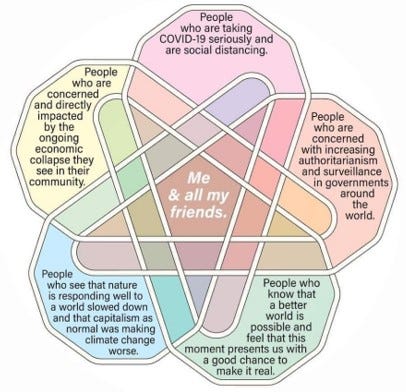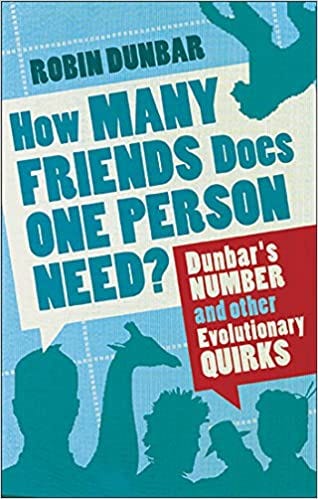Welcome to Polymathic Being, a place to explore counterintuitive insights across multiple domains. These essays take common topics and investigate them from different perspectives and disciplines to come up with unique insights and solutions.
Today's topic cracks into a quantum superposition problem, how it applies to everyday life, and why binaries are the wrong way to look at things. In this case, we discuss the application to politics and tease out a nuance few slow down to appreciate.

I recently listened to the Portal, a podcast by Mathematician Eric Weinstein, who did an intro to Episode 35 on quantum physics applied to dialog. Simply put, we often create deterministic binaries in physics merely because it is computationally challenging to factor all of the probabilistic considerations that exist. Schrodinger’s cat is a great example of the false dichotomy. It’s only the binary that creates a paradox that the cat is both alive and dead. Quantum physics doesn’t work well under binaries and neither does politics.
I find the superposition dilemma fascinating because I think it highlights my position very well. Life is not dichotomies nor is it black and white. As Eric Weinstein eloquently captures the challenge in his conclusion:
“The principle of superposition is not limited to quantum weirdness, and it may be governing your life at a level that you never considered. Think about where you are most divided from your loved ones politically. Then ask yourself, when I listen to the debates at my dinner table, am I hearing a set of multiple-choice answers that sound like they were developed by scholars interested in understanding, or by activists who are pushing for an outcome? If the latter, think about whether you couldn't make more progress with those you love by recognizing that the truth is usually in some kind of a superposition of the last remaining answers pushed by the activists. But you don't have to accept these middlebrow binaries, dilemmas and trilemmas. Instead, try asking a new question. If my loved ones and I trashed the terms of debate foisted upon us by strangers, activists and the news media, could we together fashion a list of multiple choice answers that we might agree contain an answer we all could live with, and that better describes the true state of the system?”1
I find that I’m accused of being a lot of things because, in a world of answer choices A or B, questioning A must mean I support B or vice versa. I realize I normally neither accept A nor B as I find them missing critical substance and, instead, am trying to find out if there is at least a C and more likely expecting that there is an A – n. But that is nuanced and results in “so what you’re saying is ______” accusations, straw-manning my position to discount it.
I’m not limited to the binary and can hold my own state in a complicated Venn diagram such as the one below regarding COVID. I can also be perceived as having multiple states at once. Yet I more often get accused of being in the opposing state of whomever I discuss with. We live in a multi-dimensional world and yet are reduced in life to mono-dimensional politics and discussions. I don’t have to be right. I just certainly dislike being wrong. Right is somewhere A–n. Wrong is believing it is only A or B.
In this vein, I think politics are an interesting problem where we marginalize entire political philosophies because they either don’t scale up or down. Instead of rejecting them for what they don’t do well, let’s take a moment to better understand and leverage their strengths. We’ll discuss three prime examples in anarchism, socialism, and libertarianism and then explore an example of how to actually layer political philosophies from A – n and avoid the superposition dilemma.
We’ll start with Socialism. This one immediately starts off highlighting the issue because I feel we have to differentiate small “s” socialism from big “S” Socialism. The first is the sharing, caring, collaboration, and community aspects we hear about. The second is the State attempting to perform the same thing across a large demographic. The issue isn’t that socialism doesn’t work; it’s that [s]ocialism doesn’t scale to [S]ocialism. Big “S” Socialism has spectacularly failed in every single instance it has been applied. Little “s” socialism actually exists, thrives, and benefits the population in many places we haven’t even considered!
I like to ask people: “Where the best socialists in America are today with the longest history of success?” I proffer that they are in churches, specifically in the US, with Mormonism as one of the best examples. The church level is where socialism scales best. These organizations are smaller, mono-cultural, with a predisposition to benevolent dictatorship. Churches take care of their congregations the way many people want our governments to take care of us. It works brilliantly in the church, but why doesn’t it scale up to the government?
Similarly, Anarchism (the philosophy not the rioters) doesn’t scale up. This philosophy requires individuals to interact without the oversight or structure of larger organizations or governments. It requires quickly negotiating expectations, engagement rules, and fair values without the threat of coercion or force. This philosophy works on the individual level but why doesn’t it scale up to large-scale applications?
The simple answer as to why these don’t scale has to do with Dunbar’s Number, which is a suggested cognitive limit to the number of people with whom one can maintain stable social relationships—relationships in which an individual knows who each person is and how each person relates to every other person.2 Robin Dunbar expands on this concept in his book How Many Friends Does One Person Need (which is also essential reading in our social media-saturated world) and identifies that we are limited to approximately 150 unique relationships.
This 150-person cognitive limitation means that we have to apply heuristics, profiles, and systems to manage the expanded relationship set. Simply put, anarchism and socialism don’t scale well over 150 people because of the complexities of relationships, the limitations of individual trust, and the increased risk of manipulation and exploitation of the systems.
Knowledge of this limit has existed outside of the explicit scientific context for millennia. Roman legions were structured around units of 100 soldiers, led by a centurion because it was the largest unit that could still fight well without further sub-dividing. This layered structure has been maintained and matured into our modern military hierarchies, company organizations, and social structures. Large churches, like the Catholic Church, have to establish multiple hierarchical layers to handle larger sizes where each congregation or subset has approximately 150 members. Active management of larger organizations is the only method by which these organizations can be this large.
Dunbar’s Number is what causes anarchism to fail at scale. Individuals simply cannot compute the permutations required to manage that many idiosyncratic relationships without the help of overarching systems. Anarchism is also very prone to deadbeats because anarchistic organizations often strive to avoid the very governmental structures that establish the discipline and consequences when someone does not do their part as evidenced by the failure of almost every commune ever tried. Anarchism works within the Dunbar Number but doesn’t scale outside of it.
Likewise, socialism and social safety nets in general work best in a tight-knit and constrained community but also require a second element: homogeneity. What allows the social systems in the Nordic countries to work well is that they are small and homogeneous in culture. There’s a common expectation of everyone that you have a safety net if you need it, and the expectation is you climb out of the net and back up quickly. When you add in members who land in the net and decide to never leave it, the system starts to collapse. This is one of the primary failure modes of every Socialist state attempted to date. Achieving the socialism they desire, amongst group, social and ethnic stratifications, requires a level of top-down authoritarianism that simply can’t manage the size and scope of the situation.
Conversely, Libertarianism doesn’t scale down. It manages large, complicated government structures and economic markets quite well but it fails to handle the social systems or public works projects that are needed within communities. For example, a common trope in Libertarian groups is to privatize roads. The issue instantly emerges that you’d have to collect tolls to fund these roads. With limited oversight of the process, your commute to work would naturally cause you to travel on multiple, differently managed, private roads. Notwithstanding the headache of toll booths (which by and large are being replaced), it just becomes difficult to manage so many independent payments. What you’d see emerge is exactly what we currently see with the bevy of cross-state toll passes. This could turn into bundled subscription services based on use, route, etc. that you’d pay at intervals. Fundamentally, this becomes indistinguishable from your taxes with the exception of who collects and spends it. The difference is, in democratic countries, you can at least vote for who is collecting and spending that money.
Photo from E-ZPass Group
The final issue with the privatization of roads is ensuring open access. There is current frustration with social media sites like Facebook and Twitter banning certain content and people and private roads would require government oversight ensuring access.
Libertarianism does work well at the higher levels though. It crafts solid, overarching guidelines for consistency such as trade and foreign policy, reduces governmental overhead and delegates further responsibility. Clearly, Libertarianism doesn’t suffer from the same issues as anarchism and socialism, but it misses the intimate and community implications that empower those philosophies. Libertarianism works well at high levels but it just doesn’t scale down effectively.
So then, how do we avoid these superposition dilemmas? I’ll use myself as an example where I’ve already laid the foundation for rejecting the binary. What follows is my attempt to apply an A – n application of political philosophies that I find work well, don’t conflict and don’t require mental gymnastics to reconcile:
With my wife, I have an anarchistic relationship. I don’t have authority over her and she doesn’t have authority over me. We are free to negotiate and re-negotiate expectations as the needs arise.
With my friends, I also have an anarchistic relationship. Clearly, I can’t control them and I don’t allow them to control me. We engage together under tailored and balanced expectations.
With my kids, I’m a benevolent dictator. They aren’t mature enough to handle the complex idiosyncrasies of life yet and my goal is to develop them into independent individuals with an end state of having an anarchistic relationship with each of them as they become adults.
At my extended family, group social, ie: ‘church’ level, I’m a socialist. I believe in taking care of each other and helping everyone out. If you need help, and I’m able, I’ll help. There isn’t anything about small ‘s’ socialism that I disagree with at this level.
At the municipality/city level, I lean more toward the US Democrat party. I think we need strong safety nets, I think we need an eye on public works and infrastructure, as well as the tolerance for our close neighbors that this political party espouses.
At the state level, I’m more of a US Republican. Free market economies, a solid larger scale (but not too large) infrastructure view, solid patriotism, and an increasing focus on security.
At the Federal level, I’m a Libertarian. Limited government, non-imperial tendencies, open trade, and diplomacy. In this way letting the other layers thrive without a heavy-handed top-down approach.3
In this way, I avoid the superposition dilemma. I can accept the nuanced benefits of each political philosophy and reject what doesn’t work. It’s not a binary because these systems have difficulty scaling across the entire scope. It just isn’t feasible to expect them to! Our human evolution has put cognitive limitations and biases in place that don’t allow it.
The superposition dilemma is a problem of perception, not reality. Once we learn to reject the binary and open our eyes to see how these concepts actually apply, we can appreciate and enjoy the benefits of each system. Most importantly we can identify and avoid the polarization and division that is occurring in the public dialog. It takes work to compute the permutations and nuance, but the result is a more accurate worldview, healthier conversations, and the ability to respect and leverage different political philosophies.
Enjoyed this post? Hit the ❤️ button above or below because it helps more people discover Substacks like this one and that’s a great thing. Also please share here or in your network to help us grow.
Polymathic Being is a reader-supported publication. To receive new posts and support my work, consider becoming a free or paid subscriber.
Dunbar, R. I. M. (1992). "Neocortex size as a constraint on group size in primates". Journal of Human Evolution. 22 (6): 469–493. doi:10.1016/0047-2484(92)90081-J.
Edit 10/2024: It has come to my attention that Nassim Talib wrote something similar in Skin in the Game. I had not read nor heard that prior to writing this essay and have had this model for about a decade. I guess great minds think alike!








Very insightful article.
Good essay. The only thing I would quibble about is the Americanisation of socialism. Just because the American right says something is socialist doesn't mean it is. There are two definitions which really hold true when discussing socialism. The first is the State running the economy or certain sectors.
To give an example. Let's look at the difference between the UK and Australia in terms of universal healthcare. The UK government actively funds and controls the NHS- but it's the last part that counts. We Brits love our NHS- it's practically a state religion- but I have known quite a few people over the years who have worked for NHS and not a single one had a good thing to say about the way it was run.
By contrast, Australian taxpayers funds pay for universal healthcare, but all of the healthcare is privately commissioned. It's efficient, well-run and provides an excellent service. Although it's paid for by the taxpayer the system used is free market capitalism.
The second form of socialism is the worker owning the means of production- or, in other words, their own labour- in modern parlance this is market socialism. Usually when people say they are in favour of market socialism they are being disingenuous, because not only do they set all forms of conditions to the market which favour worker owner enterprise over capitalist enterprise, but they also actually have the gall to suggest that the taxpayer should fund the start-ups. This is not market socialism, but the state control of the economy by other means.
There are good examples of successful worker owner co-operatives- the largest being the Basque worker owner co-operative in Spain, Mondragon. Economically, they would more properly be defined as community capitalism- but they also fulfil the conditions of the worker owning the means of production so technically they are also market socialism.
In theory, it might be possible to create a model for true market socialism, by asking investors to invest their money in helping owners own the means of production. But the condition would be they would have to value the psychic profit of helping workers achieve this aim more than any financial return on their investment, because any return on investment is simply capitalism by another name, however altruistically intended.
However, I did have a cunning thought the other day. Any losses made on investment because of risk and losses could be refunded from taxes paid by the individual taxpayer. After all, refunding someone's taxes isn't socialism, it's libertarianism. So, in other words a friendly government could slightly help a model of libertarian market socialism, but anything further would be socialism.
Socialism is not about the money, it's about the control- through government force and coercion. This may seem like quibbling over words and definitions, but ask any current Prime Minister of the Nordic states whether they are democratic socialists and they will splutter, protest and say no 'we are a free market capitalist society in which our citizens have chosen to pay higher taxes to fund larger social safety nets'.
https://www.youtube.com/watch?v=RO7wgS5tdz4
Sweden is so friendly to capital, they don't have an inheritance tax (they worked out they could gain more revenue from corporation tax and CGT, if they didn't charge an inheritance tax). It was a huge gain in revenue over time- Swedish revenue from CT was 2.75% of total revenue a few years back, compared to 1.8% in the UK and 1.13% in the US, and this before one considers CGT.
Again, good essay. Nice way of breaking through the usual cognitive inflexibility.